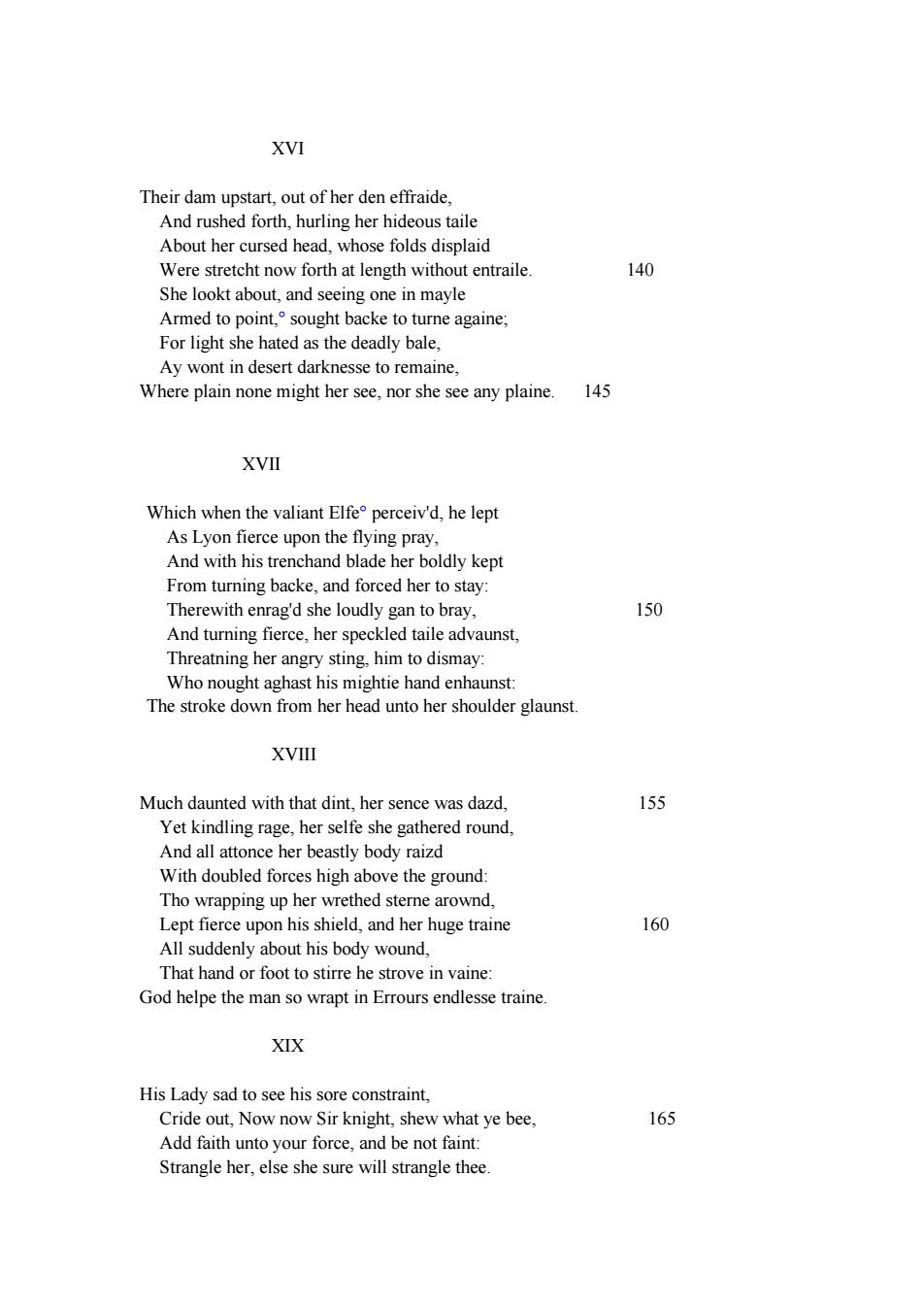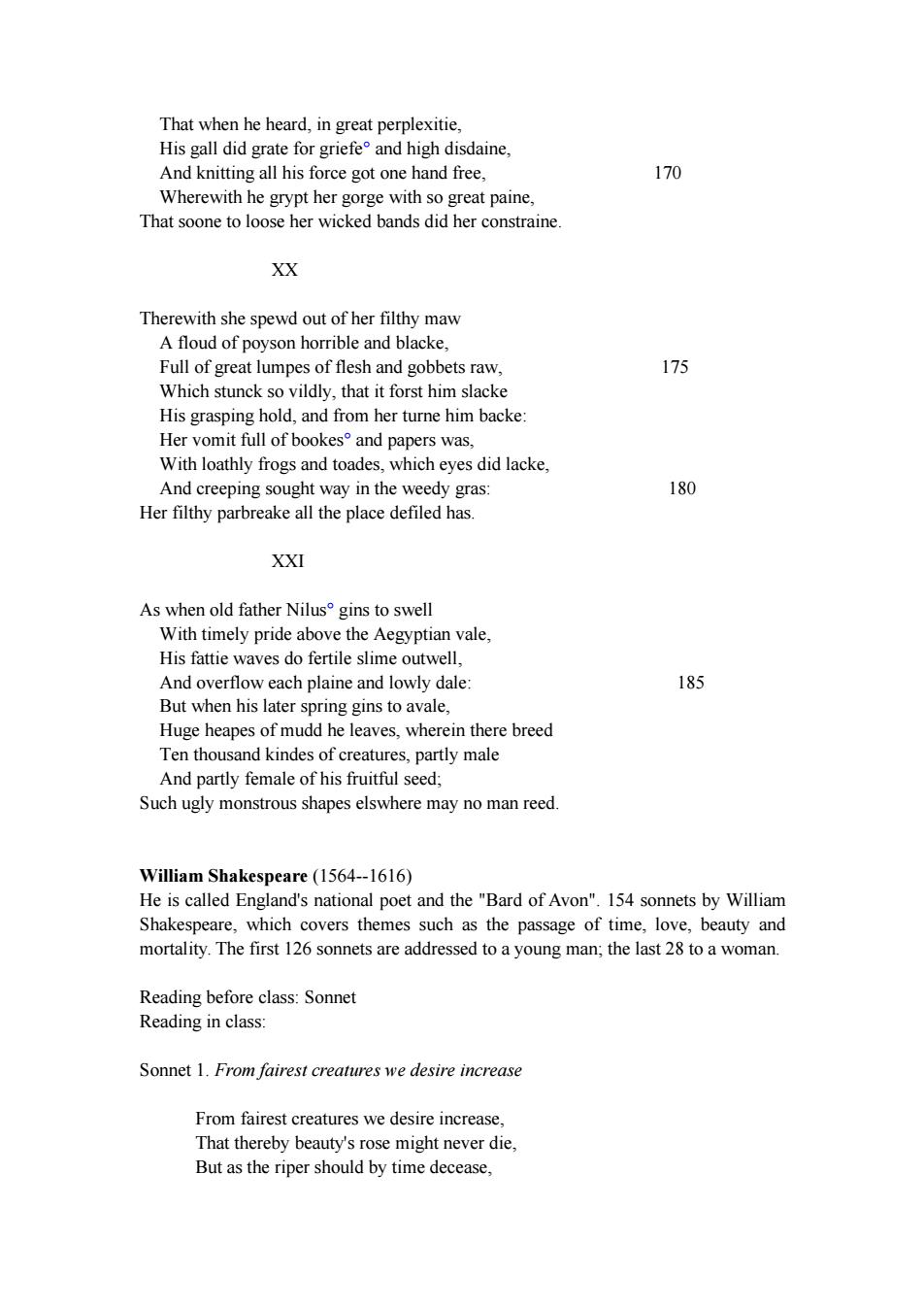
XVI Their dam upstart,out of her den effraide, And rushed forth,hurling her hideous taile About her cursed head,whose folds displaid Were stretcht now forth at length without entraile 140 She lookt about,and seeing one in mayle Armed to point,sought backe to turne againe; For light she hated as the deadly bale, Ay wont in desert darknesse to remaine, Where plain none might her see,nor she see any plaine.145 XVII Which when the valiant Elfe perceiv'd,he lept As Lyon fierce upon the flying pray, And with his trenchand blade her boldly kept From turning backe,and forced her to stay: Therewith enrag'd she loudly gan to bray, 150 And turning fierce,her speckled taile advaunst, Threatning her angry sting,him to dismay: Who nought aghast his mightie hand enhaunst: The stroke down from her head unto her shoulder glaunst XVIII Much daunted with that dint,her sence was dazd, 155 Yet kindling rage,her selfe she gathered round, And all attonce her beastly body raizd With doubled forces high above the ground: Tho wrapping up her wrethed sterne arownd, Lept fierce upon his shield,and her huge traine 160 All suddenly about his body wound, That hand or foot to stirre he strove in vaine: God helpe the man so wrapt in Errours endlesse traine. XIX His Lady sad to see his sore constraint, Cride out,Now now Sir knight,shew what ye bee, 165 Add faith unto your force,and be not faint: Strangle her,else she sure will strangle thee
XVI Their dam upstart, out of her den effraide, And rushed forth, hurling her hideous taile About her cursed head, whose folds displaid Were stretcht now forth at length without entraile. 140 She lookt about, and seeing one in mayle Armed to point,° sought backe to turne againe; For light she hated as the deadly bale, Ay wont in desert darknesse to remaine, Where plain none might her see, nor she see any plaine. 145 XVII Which when the valiant Elfe° perceiv'd, he lept As Lyon fierce upon the flying pray, And with his trenchand blade her boldly kept From turning backe, and forced her to stay: Therewith enrag'd she loudly gan to bray, 150 And turning fierce, her speckled taile advaunst, Threatning her angry sting, him to dismay: Who nought aghast his mightie hand enhaunst: The stroke down from her head unto her shoulder glaunst. XVIII Much daunted with that dint, her sence was dazd, 155 Yet kindling rage, her selfe she gathered round, And all attonce her beastly body raizd With doubled forces high above the ground: Tho wrapping up her wrethed sterne arownd, Lept fierce upon his shield, and her huge traine 160 All suddenly about his body wound, That hand or foot to stirre he strove in vaine: God helpe the man so wrapt in Errours endlesse traine. XIX His Lady sad to see his sore constraint, Cride out, Now now Sir knight, shew what ye bee, 165 Add faith unto your force, and be not faint: Strangle her, else she sure will strangle thee

That when he heard,in great perplexitie, His gall did grate for griefe and high disdaine, And knitting all his force got one hand free, 170 Wherewith he grypt her gorge with so great paine, That soone to loose her wicked bands did her constraine. XX Therewith she spewd out of her filthy maw A floud of poyson horrible and blacke, Full of great lumpes of flesh and gobbets raw, 175 Which stunck so vildly,that it forst him slacke His grasping hold,and from her turne him backe: Her vomit full of bookes and papers was, With loathly frogs and toades,which eyes did lacke, And creeping sought way in the weedy gras: 180 Her filthy parbreake all the place defiled has. XXI As when old father Nilus gins to swell With timely pride above the Aegyptian vale, His fattie waves do fertile slime outwell, And overflow each plaine and lowly dale: 185 But when his later spring gins to avale, Huge heapes of mudd he leaves,wherein there breed Ten thousand kindes of creatures,partly male And partly female of his fruitful seed; Such ugly monstrous shapes elswhere may no man reed. William Shakespeare (1564--1616) He is called England's national poet and the "Bard of Avon".154 sonnets by William Shakespeare,which covers themes such as the passage of time,love,beauty and mortality.The first 126 sonnets are addressed to a young man;the last 28 to a woman. Reading before class:Sonnet Reading in class: Sonnet 1.From fairest creatures we desire increase From fairest creatures we desire increase, That thereby beauty's rose might never die, But as the riper should by time decease
That when he heard, in great perplexitie, His gall did grate for griefe° and high disdaine, And knitting all his force got one hand free, 170 Wherewith he grypt her gorge with so great paine, That soone to loose her wicked bands did her constraine. XX Therewith she spewd out of her filthy maw A floud of poyson horrible and blacke, Full of great lumpes of flesh and gobbets raw, 175 Which stunck so vildly, that it forst him slacke His grasping hold, and from her turne him backe: Her vomit full of bookes° and papers was, With loathly frogs and toades, which eyes did lacke, And creeping sought way in the weedy gras: 180 Her filthy parbreake all the place defiled has. XXI As when old father Nilus° gins to swell With timely pride above the Aegyptian vale, His fattie waves do fertile slime outwell, And overflow each plaine and lowly dale: 185 But when his later spring gins to avale, Huge heapes of mudd he leaves, wherein there breed Ten thousand kindes of creatures, partly male And partly female of his fruitful seed; Such ugly monstrous shapes elswhere may no man reed. William Shakespeare (1564--1616) He is called England's national poet and the "Bard of Avon". 154 sonnets by William Shakespeare, which covers themes such as the passage of time, love, beauty and mortality. The first 126 sonnets are addressed to a young man; the last 28 to a woman. Reading before class: Sonnet Reading in class: Sonnet 1. From fairest creatures we desire increase From fairest creatures we desire increase, That thereby beauty's rose might never die, But as the riper should by time decease